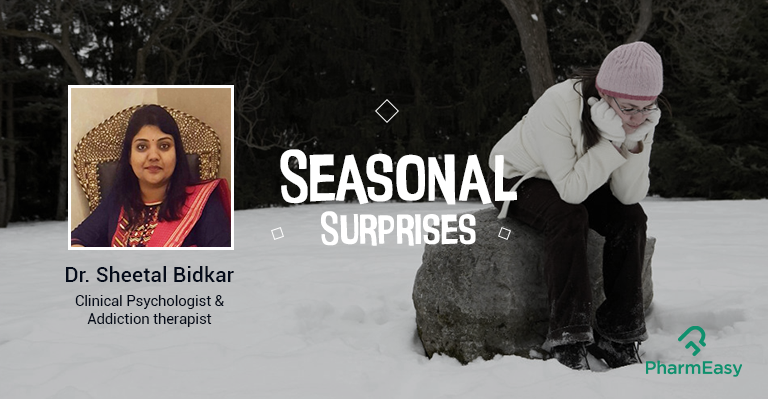Effects Of Climate On Depression By Dr Sheetal Bidkar
By Dr. Nikita Toshi +2 more

Get,

to manage your symptom
Get your,


4 Cr+ families
benefitted

OTP sent to 9988776655



You’ve successfully subscribed to receive
doctor-approved tips on
Whatsapp

Get ready to feel your best.

Hi There,
Download the PharmEasy App now!!


Register to Avail the Offer
Send OTPBy continuing, you agree with our Privacy Policy and Terms and Conditions

Hi There,
Sign up on PharmEasy now!!
Trusted by 4 crore+ families

OTP sent to 9988776655



You have unlocked 25% off on medicines




Code: NU25
By Dr. Nikita Toshi +2 more
Mr X, a 20-years old MBA student, came to the clinic with his father. The extraordinarily brilliant yet soft-spoken and introverted boy got admission to an MS course in Germany. He is goal-oriented and emotionally prepared to go out of the country. While pursuing engineering before his MBA, he adjusted very well to hostel life without his parents.
But this time, when he went to Germany within two days, he experienced the following signs: feeling extremely sad, unprovoked crying bouts, lack of will to do anything and felt he must go back to India as studying here is not his cup of tea.

Well, his parents and Mr X both felt that he was homesick and thus decided to visit home and go to the campus after a ten to fifteen days gap. Immediately after coming to India, Mr X, to his surprise, was feeling entirely healthy and motivated and his mood was also fine. Instead of fifteen days, he decided to fly back in five days. He reached Germany and similar feelings and symptoms returned. He was crying the whole day, unwilling to do anything and feeling worthless and hopeless, negative thoughts bombarded his mind and he had difficulty falling asleep. Well, this time, he was hesitant to tell his parents that he wanted to come back home. He tried to manage with the help of roommates but couldn’t. As a result, he went back again. His family was upset with his decision to run back home. No one was able to understand why this well-adjusted and mature child was facing difficulty in pursuing his degree in his dream college.
When he came to Search One Step Clinic, the Psychologist assessed him and told him this was not because of his inability to cope with a new environment, nor was it due to his immaturity or impulsiveness, but primarily it is because of the effect of the season.
Table of Contents
Mr X had never been to any cold countries before. Life outside of India, especially in European countries, is much slower and the pace of life slows down even more in the cold season. Winter is recorded as the laziest period of the year. So, we deduced that Mr X was suffering from Seasonal affective disorder (SAD). SAD is a category of depression that appears in particular seasonal conditions. Mostly in the cold season, many people suffer from SAD symptoms. Many people begin to recognize symptoms of SAD in the fall and it just gets worse in the winter months. However, some people even experience the same in the months of summer and spring.
Persons with the winter version of SAD might also notice the following unique symptoms:
Symptoms specific to summer-onset seasonal affective disorder, sometimes called summer depression, may include:
Read More: Physical & Mental Sign of Depression
What really causes and triggers SAD remains elusive, i.e. it is still unknown. Some known triggers that be responsible are:
Melatonin levels. The change in season can disrupt the balance of the body’s level of melatonin, which plays a role in sleep patterns and mood.
Read More: Causes of Depression – What are the Reasons for Feeling Depressed?
Asking for help depends on identifying the symptoms at an early stage. Suppose the above-mentioned symptoms are disturbing your normal life, then never hesitate to reach out to a professional. Sometimes you notice major shifts in sleeping or eating, you are withdrawing socially or the activities that usually boost your mood don’t work, then it’s time to pick up your phone. Seek immediate help if you are using alcohol to manage symptoms or if you are experiencing suicidal thoughts.
It is always better to think and take a holistic approach to treatment. Medication, life skills improvement, Light therapy and self-help techniques are helpful. There is no one-size-fits-all treatment. Here are a few options to explore with your doctor.
Also Read: Treatment For Depression – Therapy, Medication & Other ways
Disclaimer: The information provided here is for educational/awareness purposes only and is not intended to be a substitute for medical treatment by a healthcare professional and should not be relied upon to diagnose or treat any medical condition. The reader should consult a registered medical practitioner to determine the appropriateness of the information and before consuming any medication. PharmEasy does not provide any guarantee or warranty (express or implied) regarding the accuracy, adequacy, completeness, legality, reliability or usefulness of the information; and disclaims any liability arising thereof.
Links and product recommendations in the information provided here are advertisements of third-party products available on the website. PharmEasy does not make any representation on the accuracy or suitability of such products/services. Advertisements do not influence the editorial decisions or content. The information in this blog is subject to change without notice. The authors and administrators reserve the right to modify, add, or remove content without notification. It is your responsibility to review this disclaimer regularly for any changes.

Leave your comment...
Comments